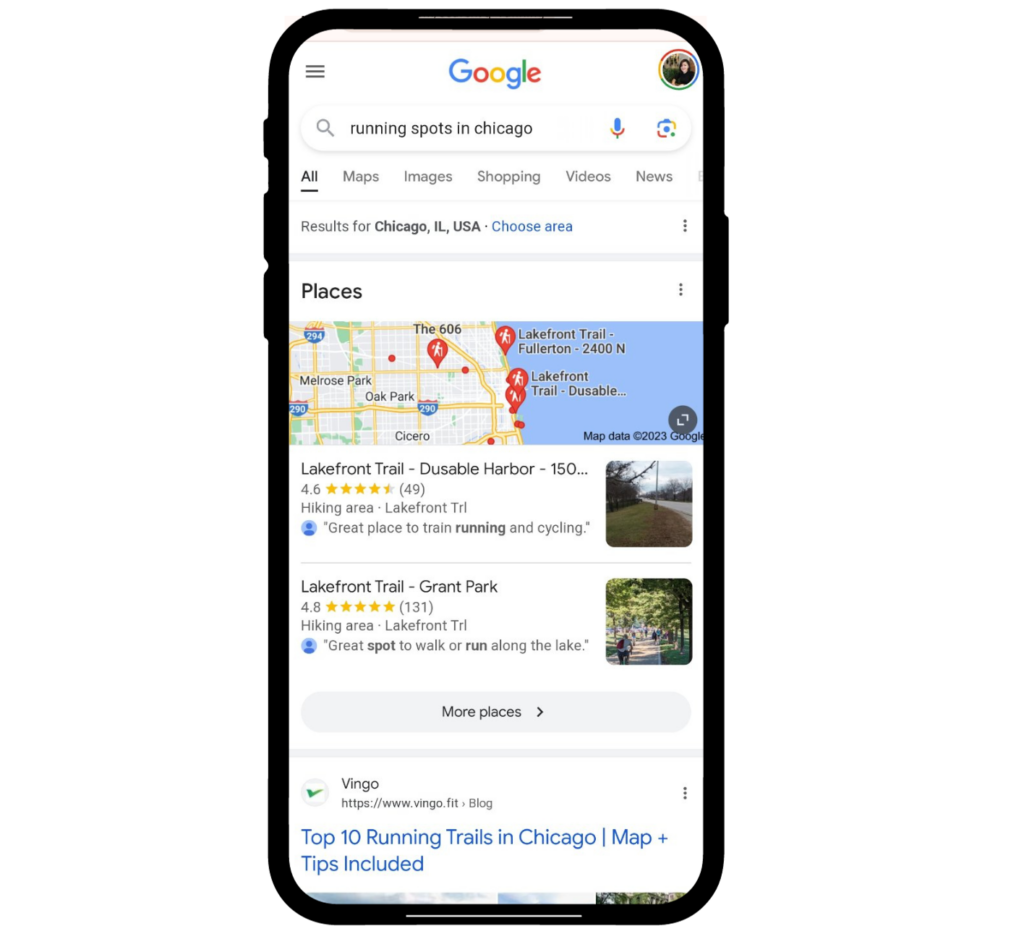Schema markup is a powerful form of optimization and a vital part of an SEO strategy. You can utilize this tool to increase your search engine ratings and increase organic traffic to your website. Let’s explore how to implement schema in SEO and answer the question, why is schema so important?
What Is Schema Markup and How Does Schema.org Function?
Schema markup is a form of structured data code that you add to your website to help search engines understand the content of your pages more clearly. This understanding allows search engines to present users with more informative and detailed results.
In other words, schema markup provides a way to describe the data on your website to search engines using a standardized vocabulary from Schema.org. When implemented correctly, this can lead to enhanced search results known as "rich snippets," including elements like star ratings, images, prices, or event times, potentially increasing click-through rates and providing a better user experience.
What is Schema.org? Schema.org is a collaborative project between major search engines like Google, Bing, and Yahoo. It provides a shared collection of schemas, i.e., HTML tags, that webmasters can use to mark up their pages in ways that the major search engines can understand. This ensures that the content is correctly indexed and returned in a way that's beneficial to users.
Understanding the Benefits of Using Schema Markup for SEO
Now that you’ve learned about what is Schema.org and how it is used, you can explore the benefits of schema markup SEO. Include rich snippets in your listings to increase click-thru rates and build credibility with Google and other search engines.
Here are some benefits to consider:
Enhanced Search Engine Visibility

Schema markup works as a translator between your site and search engines to provide clear and precise information about the content of a page. This clarity helps search engines understand the context and relevance of your content, making it easier to present it to users.
One of the most noticeable impacts of schema markup is its ability to generate rich snippets. Unlike standard search results, rich snippets display additional data, such as product star ratings, recipe preparation times, or addresses for local businesses.
For example, e-commerce websites can use the product schema to showcase prices, availability, and reviews directly in search results. Similarly, a food blog using the recipe schema can have ingredients, cooking times, and even calorie counts appear alongside the link to their site.
Featured snippets are another prominent feature influenced by schema markup. They provide concise answers to user queries and are displayed at the top of Google's search results, often called "position zero." By learning how to use schema markup for SEO, your content has a higher chance of being displayed as a featured snippet, offering increased visibility and credibility.
Knowledge graph results, often seen as panels on the right side of search results, compile critical information from various sources to provide users with comprehensive insights about entities like companies, people, places, and more. Schema markup aids in supplying accurate data to these knowledge graphs.
Finally, specific schema types can notably elevate search engine visibility for niche content. For instance:
- Product Schema: Ideal for e-commerce sites, this highlights product ratings, prices, and availability.
- Recipe Schema: Used by cooking blogs and recipe sites to display ingredients, cooking times, and even photos of the finished dish.
- Local Business Schema: Essential for local businesses, enabling them to present their address, operating hours, and contact information directly in search results.
By integrating schema markup, webmasters effectively provide search engines with a roadmap to their content, ensuring that the most relevant and engaging information is easily accessible to users.
Improved Click-Through Rates (CTRs)
A direct benefit of schema markup in SEO is the potential improvement in click-through rates (CTRs). When search results are more visually appealing and packed with relevant information, they naturally draw more attention.
Rich snippets, powered by schema markup, are a game-changer in this arena. Standard search results typically consist of a title, URL, and a brief description. In contrast, rich snippets can display a plethora of additional details.
Consider a book available for sale: whereas a standard result might merely show its title and where to buy it, a rich snippet could showcase its star rating, number of reviews, author, price, and even its cover photo.
Let's break this down further:
- Star Ratings and Reviews: When users see a product with a high star rating, it immediately instills a sense of trust and quality. Similarly, snippets that show the number of reviews provide a sense of the product's popularity.
- Price Ranges: For potential customers operating within a budget, seeing the price upfront helps in making quick decisions. It also allows users to compare prices directly from the search results.
- Visual Elements: Thumbnails or images, such as those for recipes or products, can significantly enhance the visual appeal of a search result.
E-commerce websites, in particular, can reap extensive benefits from schema markup. Online shopping is as much about convenience as it is about trust. By showcasing product ratings, prices, and availability directly in search results, e-commerce sites can provide users with essential information upfront. Moreover, if there's a special offer or sale, schema markup can help highlight that, too.
Enhanced User Experience

At its core, schema markup provides a structured framework to present data in a way that's instantly understandable, both to search engines and end-users. For instance, instead of having to click on a website to find out a restaurant's operating hours or a store's phone number, schema markup can display this data right in the search results.
Such instant access to vital information eliminates unnecessary steps for users, making their online experiences smoother and more efficient.
Local businesses, in particular, stand to gain immensely from schema markup immediately showing their address, phone number, and other contact details. This is incredibly useful for users on the go, especially those using mobile devices to find nearby services.
Knowing when a business is open or closed can be crucial, especially for restaurants, stores, and service-based entities. Schema markup can display a business's operating hours directly in search results, ensuring users know when to visit. Local businesses can also highlight their reputation by showcasing user ratings and reviews. A high average rating can be a deciding factor for many potential customers.
In addition to local businesses, entities hosting events can leverage schema markup to boost visibility. Event schema can highlight key details of upcoming events – from concert dates and artist lineups to conference themes and ticket availability. This can be posted in the search results as well as on social media. For users interested in attending events, such ready access to crucial details can influence decisions and drive ticket sales.
Mobile and Voice Search Optimization

Schema markup is future-ready, playing a crucial role in optimizing for mobile and voice searches. Given the surge in mobile browsing, structured data can assist search engines in offering pinpointed results tailored for mobile users. As for voice search, the clarity provided by schema markup enables voice assistants like Alexa or Siri to fetch relevant information for their users effectively.
Why Optimize for Voice Search?
Voice search is rapidly growing, making it vital for businesses to create an SEO strategy that includes the spoken word. People speak differently than they type, so schema markup will help you stay ahead of the curve.
How Does Voice Search Contrast with Traditional Text Search?
Voice searches are more conversational and question-based. For example, voice search queries are often phrased as questions and in a conversational tone like, "Who won the World Series in 2019?" or "How do I make spaghetti? While both voice and text search aims to provide users with accurate information, they do so in ways that cater to different user behaviors, devices, and contexts.
How to Optimize Schema for Voice Search
Using a detailed, question-based schema can provide more direct answers for voice queries. Implementing the `Question` and `Answer` schema types can be highly effective. This markup specifically addresses Q&A style content, which is prevalent in voice search. Google has introduced a `speakable` specification for marking up sections of a webpage that are most relevant to be read aloud by voice assistants.
What Types of Items Can You Apply Markup to Using Schema.org?
There's a multitude of items that you can mark up using schema.org, from articles and local businesses to events, products, recipes, software applications, and even individuals. The key is to identify the content and keywords on your webpage and then use the relevant schema to describe it.
Essentially, Schema.org allows webmasters to give search engines more specific information about their content, ensuring it's displayed appropriately in search results. Here's a detailed look at some of the most common types of items you can apply markup to using schema.org:
- Creative Works: Give summaries, including length, star ratings, and stats on articles, books, movies, music, TV, recipes, and more.
- Events: Detail upcoming events, which can range from a business conference to a music concert. Subtypes include `MusicEvent,` `SportsEvent,` `FoodEvent,` etc.
- Organizations: Provide information about an organization, which includes businesses, schools, NGOs, sports teams, etc.
- People: Include details about a person, including name, address, colleagues, job title, etc.
- Places: Use schema markup to describe a physical location. This includes specific subtypes such as `LocalBusiness,` `Restaurant,` `TouristAttraction,` `City,` `Country,` etc.
- Products: Include price, brand, model, and more.
- Medical Entities: For health and medical content, the categories range from `MedicalCondition` to `Drug,` `Hospital,` `Diet,` etc.
And there’s more. Schema.org is consistently evolving, and new item types are being added to accommodate the diverse nature of web content. By using the schema vocabulary, websites can help search engines and other applications understand their content more deeply, enabling a richer user experience and potentially better search visibility.
A Guide to Implementing Structured Data for Enhanced Website Performance
While the concept of schema markup might seem daunting, its implementation can be streamlined using JSON-LD, RDFa, or Microdata.
- JSON-LD is a lightweight linked data format, easy to add to the header of a webpage.
- RDFa is an HTML5 extension that supports linked data.
- Microdata is an open-community HTML specification used to nest metadata within existing content.
To ensure you're on the right track, make use of the Schema Markup Testing Tool and Google’s Structured Data Markup Helper. Google wants you to succeed and build a website that will offer a better user experience while boosting your business at the same time.
Implement Schema Markup for SEO Benefits
To stay competitive in your industry, you want to implement every SEO strategy available. Schema markup offers a way to enhance visibility, improve CTRs, and ensure a better user experience. Remember, it's not just about what content you put out there—it's also about how you present it.
Loupe & Blade can help you maximize the benefits of schema markup for your business. If you are overwhelmed on where to start, let our experts provide guidance. Contact our team to learn more.

No Comments.